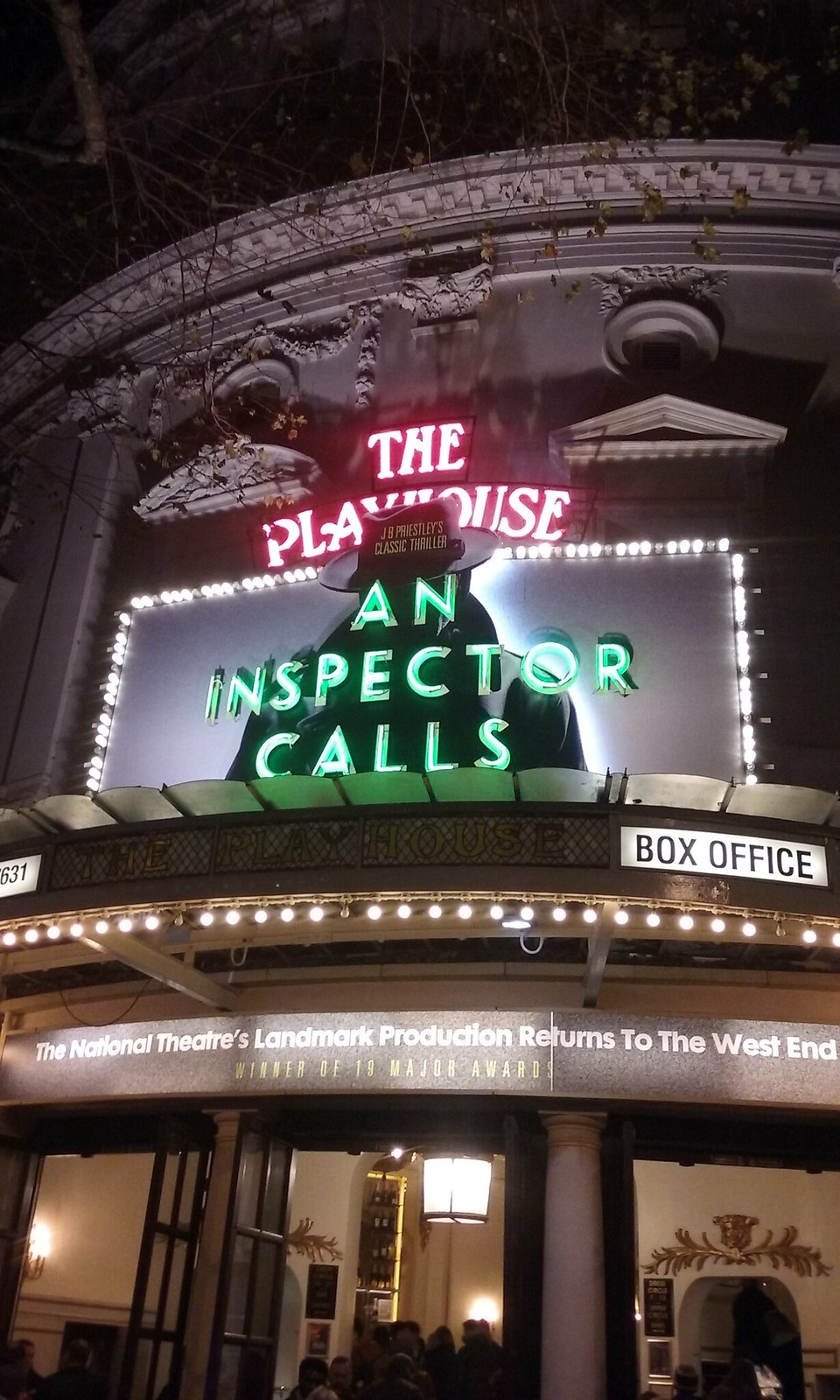 After AIC, the book, here's AIC, the visit to the theatre. E was doing it for English, and had been recommended to see the production if possible. And it seemed like a fun idea to go down to London and stay overnight. M found us Z Hotel, Orange street. This was very conveniently central, a few minutes walk from the National gallery and only five minutes from the theatre, and all very nice though the rooms are smaller than the bathroom we had at the Ritz last year.
After AIC, the book, here's AIC, the visit to the theatre. E was doing it for English, and had been recommended to see the production if possible. And it seemed like a fun idea to go down to London and stay overnight. M found us Z Hotel, Orange street. This was very conveniently central, a few minutes walk from the National gallery and only five minutes from the theatre, and all very nice though the rooms are smaller than the bathroom we had at the Ritz last year.But what of the play I hear you ask? Interesting, I reply. You've read my review of the book-of-the-play I hope. Actually watching the play, I came to realise, was a bit like having a conversation with someone about it: you got to see another perspective, and some fresh ideas, which you might or might not agree with.
The production is a revival of the landmark 1992 production and uses the same set, or so I'm told. This is, errrm, quite dramatic, which I suppose is the point: the dining room is inside a house occupying about half the stage and elevated by about six feet; and somewhat undersized, so the actors have to duck to get out of the door. This all is, I think, intended to give a feeling that the inside is all rather dolls-house, as opposed to the gritty reality of the outside world. Which is cute but facile: all the world is real; dinner parties just as much as gutters.
In the first scene the house is lit and the "understorey" is dark. As the play goes on the underneath comes clearer; and towards the end the house "falls down", and extras dressed in war garb for no clearly identifiable reason other than effect come on at the edges; so the effect is of a town ravaged by war. This fits into what I would call the "propaganda" aspect of the play, and of the staging. This clearly fits within Priestley's worldview: for him, Capitalism had caused WWI and WWII. And indeed some of the speeches within the play are intended to foreshadow this. However, there is no "evidence" for this within the play, so it all has to be done by innuendo instead; the "war" stuff is subtly mixed with the social-justice message, and by being persuaded of one (perhaps) you are insidiously lead to the other; which is why I call it propaganda. It is, effectively, dishonest; though doubtless Priestley believed it and meant well, as people always do.
Since it is a topic, I shall bang on about it some more: did Capitalism cause WWI? As already said, JBS (and many on the left) take it almost as a given, not requiring any form of evidence. The Economist disagrees; and so I think do I. In this, Old Man Birling is correct: business does not want a war, it would be bad for business.
After that, we're back to the less arguable part of the Message: you should be nice to people and consider the effect of your actions on them. Put like that it is all very motherhood-and-apple-pie; part of the skill of the dramatist is then to wrap this idea up into some fresh garb to make you think about it again. And in a way you do... a bit. But then again, we come back to Old Man Birling. He sacks the girl, after she's asked for a rise, as the Inspector somewhat dishonestly sums up towards the end. Had he done that, he'd have been in the wrong1. But he didn't: he sacked her after she'd lead a strike, which is different. So his behaviour seems excusable. If we turn to Gerald, his sins also seem weak: arguably taking advantage of a pretty young woman, but also providing her food, shelter and money and giving her a chance to recover after a difficult time. By contrast the Young Folk - Sheila and Eric - who we are invited I think to like at the end because they repent their sins - do seem to be the two characters with the most to repent. I ignore Mrs B, because she doesn't fit into my nice scheme.
On to the presentation of the play. When I read it through, it all appeared to be neat and tidy and to work well. It worked well in theatre, too. There was a slight awkwardness - to my mind - when after they realise he's not an Inspector, and that she's not one woman, it takes them ages to realise that she may not even be dead. That needs smoothing over, in my view. But that might be because I've recently read the book. Small note: was Sheila a catty over-privileged young cow who habitually dissed shop assistants, or a fundamentally nice young thing who made but one serious mistake? In the book, the latter, I think. In the play, the former: she delivers the line "I only did it once, and will never do it again" in such a way as to suggest the opposite. Such is the plasticity of language.

No comments:
Post a Comment